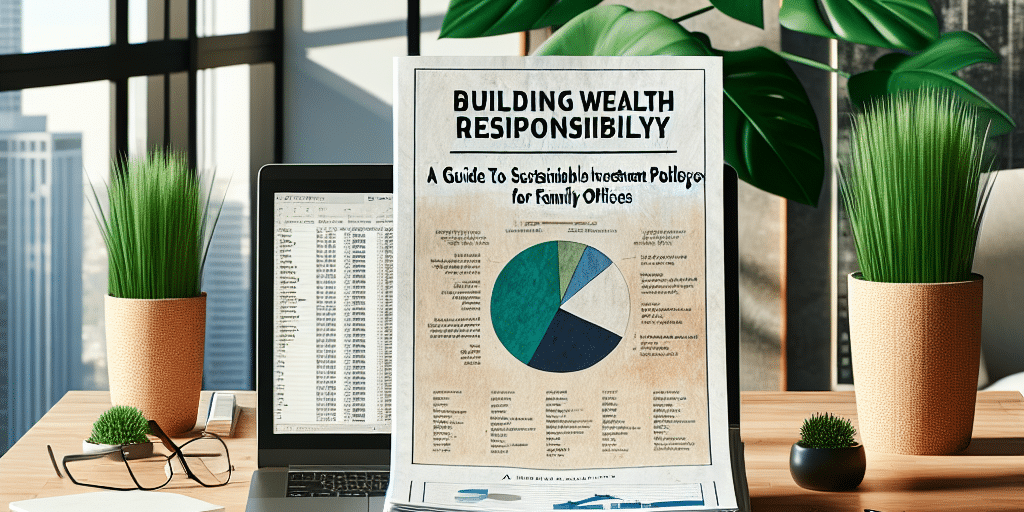In recent years, the landscape of investing has transformed significantly. Investors no longer prioritize mere financial return; instead, there is a growing emphasis on ethical considerations, social responsibility, and environmental sustainability. For family offices, which manage the wealth and investments of affluent families, understanding how to build a sustainable investment portfolio is crucial not only for preserving and growing wealth but also for aligning investments with the family’s values.
The Rise of Sustainable Investing
Sustainable or responsible investing refers to investment strategies that prioritize ESG (Environmental, Social, and Governance) factors along with financial returns. This approach acknowledges that issues such as climate change, social inequality, and corporate governance can materially impact long-term investment performance. According to the Global Sustainable Investment Alliance, sustainable investments reached $35.3 trillion in 2020, reflecting a growing trend among both institutional and retail investors.
For family offices, sustainable investing is not just about ethics; it also presents significant opportunities for growth. Research indicates that companies with strong ESG practices often outperform their peers, leading to better risk management and resilience in times of crisis. Thus, adopting a sustainable investment strategy can lead to both financial performance and social impact, aligning with the goals and values of family stakeholders.
Building an Effective Sustainable Investment Portfolio
Creating a sustainable investment portfolio involves strategic planning and a thoughtful approach to investment selection. Here are key steps to consider:
1. Define Values and Goals
Before delving into specific investments, family offices should articulate their values and long-term goals. What social causes or environmental issues does the family want to support? Defining these priorities will guide the selection of impactful investment opportunities and ensure alignment with the family’s mission.
2. Integrate ESG Criteria
Once values are established, family offices should integrate ESG criteria into their investment analysis. This involves assessing potential investments based on their environmental stewardship, social responsibility, and corporate governance practices. Various tools and frameworks exist to help investors evaluate companies on these criteria, including the SASB (Sustainability Accounting Standards Board) and TCFD (Task Force on Climate-related Financial Disclosures). Utilizing these resources can help family offices make informed decisions.
3. Diversify Investments
Just like any investment strategy, diversification is key to managing risk in a sustainable investment portfolio. Family offices might consider a mix of asset classes, including:
- Equities: Invest in companies known for their sustainable practices or funds that specialize in ESG-compliant stocks.
- Fixed Income: Explore green bonds or social impact bonds that finance projects addressing climate change or social issues.
- Real Estate: Consider investments in energy-efficient properties or funds focused on sustainable real estate development.
- Alternatives: Look into social enterprises, renewable energy projects, or impact investment funds that align with the family’s values.
4. Measure Impact and Performance
Once investments are in place, it’s essential to regularly assess both financial performance and social impact. Family offices can use various metrics to gauge the effectiveness of their sustainable investments, such as carbon footprint reduction, job creation, or contributions to community development. This ongoing analysis can help refine the portfolio and identify areas for improvement.
5. Engage with Stakeholders
Effective communication with family members and other stakeholders is vital. For many families, wealth is not only an economic resource but a means to foster legacy and community change. Regularly discussing investment strategies and aligning on goals creates transparency and enhances family cohesion. Consider establishing an advisory board or regular family meetings focused on sustainable investments to engage all relevant parties.
6. Stay Informed and Adapt
The landscape for sustainable investing is constantly evolving, influenced by regulatory changes, emerging technologies, and shifting societal expectations. Family offices must stay informed about best practices, trends, and innovations in the industry. Continuous education and flexibility will enable family offices to adapt their portfolios to changing conditions and maximize their impact.
Conclusion
Building wealth responsibly through sustainable investment portfolios is more than just a trend; it represents a commitment to creating positive change in the world while achieving financial objectives. For family offices, adopting sustainable investment practices enables them to align personal values with investment strategies, thus safeguarding their legacy for generations while fostering sustainable development.
By defining values, integrating ESG criteria, diversifying investments, measuring impact, engaging stakeholders, and staying informed, family offices can build portfolios that reflect their commitment to responsible investing while effectively managing risk and pursuing long-term growth. The journey towards sustainable wealth building is not only prudent—it is imperative in today’s interconnected, rapidly changing world.











